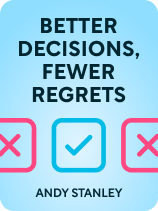

This article is an excerpt from the Shortform book guide to "Better Decisions, Fewer Regrets" by Andy Stanley. Shortform has the world's best summaries and analyses of books you should be reading.
Like this article? Sign up for a free trial here.
Why do we make bad decisions, and how can we make better ones? What does Andy Stanley’s Better Decisions, Fewer Regrets teach about decision-making?
Andy Stanley, Better Decisions, Fewer Regrets author and pastor, says we make bad decisions because we lie to ourselves. Then, he explains how questioning your biases can help you stop lying to yourself and make better decisions.
Continue reading to learn how to make choices you won’t regret.
What’s Covered in Better Decisions, Fewer Regrets?
Andy Stanley, Better Decisions, Fewer Regrets (2020) author and evangelical Christian pastor, contends that to make a good decision, you have to ask yourself the right questions about the situation. He points out that your decisions shape your life. If you’re like most people, you probably have a plan for what you want your life to look like—but you don’t have a plan for making the decisions that get you there. Stanley contends that if you take the time to ask yourself five essential questions, you’ll have the tools to make decisions that get you where you want to go.
In 1995, Stanley founded the nondenominational North Point Ministries, which has since grown to eight churches in the Atlanta metro area and more than 150 churches worldwide. He’s also the author of more than 20 books, including Parenting (2023), Not In It to Win It (2022), Irresistible (2018), The New Rules for Love, Sex, and Dating (2015), and How to Be Rich (2013).
In Better Decisions, Fewer Regrets, Stanley writes that good decisions enable you to build a life you feel proud of. In this article, we’ll examine how Stanley defines a good decision—and how he defines a bad one. Then we’ll dive into his explanation of the reasons we tend to make bad decisions and break down the questions he recommends using to structure your decision-making process. We’ll also put Stanley’s advice into the context of what other experts say about how we make decisions and how we can improve our decision-making to build happier and healthier lives.
| Who Is Andy Stanley? Stanley has built his expertise in decision-making through his career as an evangelical Christian pastor and founder of North Point Ministries, one of the biggest megachurches in the US. He often describes wanting to reach people outside of the conservative Christian world, a focus that shapes his message. For instance, Stanley has broken with other evangelical leaders in not talking about politics. In Not in It to Win It, he argues that Christians should hold themselves above the political fray. Some readers have criticized the book as arguing for upholding the status quo instead of fighting injustices. Others express frustration that Stanley hasn’t promoted or criticized the conservative agenda popular among evangelicals. Because of what observers describe as his tendency to avoid drawing lines in the sand, Stanley has been accused of being too accommodating or too tolerant. He made waves in the evangelical world by refusing to condemn LGBTQ people or their relationships—a message some critics have called “subversively anti-Christian”—and instead advocating for restoring relationships between parents and their LGBTQ children. Stanley also attracted criticism for stating that it’s not enough to be nonracist, and that one must be antiracist, an insight he might have learned from Stamped from the Beginning author Ibram X. Kendi. Stanley likely crafts his messages knowing he’ll come under fire from both sides of the aisle. He’s said that he believes the path forward from division lies in “the messy middle.” Speaking before the Georgia House of Representatives, Stanley said that to solve social and political problems, “we all have to get out of our Republican and Democrat bucket and walk toward the middle and that’s not popular.” He acknowledged that being in the middle makes you a target for both sides, but he still believes that that challenging path forward is the right one to take. |
What’s a Good Decision?
We’ve all made decisions that we’re happy with and decisions we’re not so proud of. But few of us have stopped to ask ourselves: What makes a good decision? According to Stanley, it’s a combination of three factors:
First, a good decision moves you in the direction you want to go, whether in your relationships, career, finances, or another area of your life. A decision that’s right for you makes sense as part of your vision for where you want your life to go.
Second, a good decision accords with your values. Stanley is a pastor, and he’s writing about making decisions that align with Christian values and help you follow the path God has chosen for you. (In the book, Stanley illustrates his points with stories about decision-making in the Bible.) A good decision helps you to embody the values that mean the most to you.
Third, a good decision is made purposefully and thoughtfully. Stanley contends that we often don’t make good decisions when we feel rushed or if we make a choice without thinking through all the options. He writes that a good decision is one that you approach purposefully—by asking yourself a series of questions that we’ll explore later in the guide.
What’s a Bad Decision?
We’ve defined a good decision. But then what makes a bad decision? Stanley writes that a bad decision creates regret. He explains that bad decisions can be inconsequential or very consequential—but either way, they make you want to go back and make a different choice. However, you only regret a decision after you’ve made it. So while regretting a decision might help you if you face a similar choice in the future, it can’t keep you from making a decision you’ll regret in an unfamiliar situation. (Shortform note: Some experts describe regret as a time machine: an emotion we feel in the present about something that happened in the past that helps us to make better choices in the future.)
In explaining that bad decisions lead to regret, Stanley says that what we know about regret can help you to make better decisions. He says certain types of decisions tend to be the ones that we regret later, so they’re the ones you should be most careful with. According to Stanley, the decisions that most often lead to regret tend to fall into one of three categories:
1) Purchases We Regret
First, we often make purchases we’ll regret. Sometimes these purchases are small and harmless, like a marked-down sweater in a color you’ll never wear or a novel you’re only buying because everyone else is reading it. These aren’t great decisions, and they’re a waste of money. But they’re small enough that you can laugh about them later—after you’ve found a new home for the sweater or book. Sometimes, though, the purchases you regret are bigger. For example, you might buy a car that costs far more than you budgeted or book a vacation that costs more than you can afford. These decisions involve large enough amounts of money that they can become setbacks from your financial goals.
2) Relationships We Should Leave
Second, we talk ourselves into staying in relationships we should leave. Stanley explains that we often regret holding onto relationships (or situationships) long after they’ve run their course. For example, you might waste months dating someone whom you know, deep down, isn’t the right partner. Or perhaps you put years of effort into a one-sided friendship with a person who doesn’t value you. Stanley explains that when we talk ourselves into staying in relationships, we later regret it. We ignore obvious cues that the relationship isn’t a good fit, telling ourselves a more positive story about the other person and the prospects for our future with them.
3) Habits That Can Harm Us
Third, we easily fall into habits that can harm us, and we regret it later. Stanley explains that when we indulge our bad ideas repeatedly, we make the same poor decision so many times that a small vice becomes a harmful habit or even an addiction. Imagine making a habit of leaving major projects unfinished until the night before the deadline: You’ll likely end up letting your colleagues down and hurting your reputation at the office. Similarly, if you fall into the addictive pattern of spending hours scrolling through social media at night, you’ll find it harder to be present with your family and miss out on time with the people you love. These decisions seem small in the moment, but they add up to habits that are hard to break.
Why Do We Make Bad Decisions? And How Can We Make Better Ones?
So we’re good at making bad decisions—great at it, even! But why does it come so naturally to us to make choices that we’ll regret, choices that undermine how we want to spend our time and what we want to accomplish in our lives? According to Stanley, there’s a fundamental explanation for all of this: that we make bad decisions because we lie to ourselves. In this section, we’ll explore what Stanley means when he says that we deceive ourselves in ways that undermine good decision-making. We’ll also look at the reasons we aren’t truthful with ourselves and examine his advice for how we can break this destructive habit.
We’re Bad at Decisions Because We’re Good at Lying to Ourselves
Stanley explains that when we make a choice, we tell ourselves a story about the situation we’re facing and the options we have in front of us. But we tend to tell ourselves stories that aren’t true, and Stanley contends that this is the problem at the heart of our bad decisions. He points out that we often make up stories to deceive ourselves (and sometimes others, too) so that we can feel good about choosing what we feel like doing over what we should be doing. But failing to be truthful with ourselves can lead us away from good, sound, responsible decisions and toward decisions that we’ll later regret.
Most of the time, you don’t make a decision knowing that you’ll regret it later (your justification for that extra slice of pizza aside). So how can you know when you’re using a not-so-faithful interpretation of the facts to justify a decision? Stanley explains that when you realize you’re talking yourself into something or making excuses for yourself, that often signals that you’re gearing up to make a bad decision, and using a bad story to do it. The key insight here is that we often lie to ourselves because we’re motivated to do so: Telling ourselves the truth might make us feel bad about ourselves, and fudging the truth a little makes us feel better. But that effect is temporary, and we’ll have to face the consequences of our decisions sooner or later.
Biases and Errors in Our Thinking Make It Easy to Lie to Ourselves
Stanley blames our ability to lie to ourselves on the cognitive biases built into our brains. Cognitive biases occur when your brain tries to make the decision-making process faster or easier and takes a shortcut that yields a less rational decision. Because your cognitive biases can keep you from thinking logically about a decision, they make it easier to choose based on how you feel right now rather than what you think might happen later. Cognitive biases make it easy for you to lie to yourself about what you should do. That reduces your chances of making a good choice, one that you’ll look back on later and be glad you made.
How to Make Better Decisions by Questioning Your Biases
To guard against the tendency to tell yourself stories that aren’t true, courtesy of your cognitive biases, Stanley recommends deliberately structuring your decision-making around five questions. Each question can help you think more critically about the stories you tell yourself and push you to think more clearly about what decision you should make. Ahead, we’ll look at five methods that Stanley recommends for improving your decision-making, each paired with a specific question that can help you push beyond a cognitive bias that tends to affect decision-making.
1) Stop Ignoring Information You Dislike
The first cognitive bias that Stanley addresses is the confirmation bias. Because of this error, we pay more attention to information that confirms what we believe (or what we want to believe) than to information that challenges our ideas. This means that when you’re facing an important choice, you naturally pay attention to the evidence that tells you you’re right—and dismiss all of the signals that there might be another way to look at the situation.
2) Think About the Future Instead of Focusing on Now
A second bias in our thinking makes us value what we want in the present more highly than what we’ll want in the future. Stanley explains that because of a cognitive tendency called focalism, we exaggerate the importance of what we’re focused on and let it block out everything else. Often, that’s the opposite of what we need to do to make a good decision.
3) Don’t Disregard Your Intuition
The third mistake in our thinking that Stanley points out isn’t a cognitive bias, but instead is a logical error called the genetic fallacy. Because of this problem with our reasoning, we tend to dismiss certain pieces of information on the basis of where that information came from, thinking we’re justified in ignoring information from certain sources. Stanley argues that one of the most harmful ways you use the genetic fallacy is to dismiss signals from your intuition.
4) Stop Aiming Low With Your Behavior
A fourth mistake that Stanley identifies as a flaw in our decision-making is the kind of black-and-white thinking where we assume that something is either wrong or right—and if an action isn’t obviously wrong, then it’s totally fine. Stanley explains that we set standards for ourselves and how we’ll behave as partners, parents, friends, professionals, and people. However, we’re often lazy with our behavior, and we’re less concerned with reaching our highest standards than we are with just doing the bare minimum and meeting our lowest standards.
5) Look Beyond Your Individual Perspective
Finally, the fifth error in our thinking that Stanley addresses is our tendency to get stuck seeing things from our own perspective. When we focus entirely on our point of view, we miss the opportunity to think about how other people in our lives and communities are affected by the things we do. We also miss the chance to make a choice that respects and honors other people. Stanley explains that in all our relationships, we can make decisions that will improve other people’s lives. He contends that we should do this not because it guarantees that the other person will put the same kind of effort into the relationship—it doesn’t—but because caring for other people is the one decision that we can always be certain is the right one.
Exercise: Practice Being Honest With Yourself
Stanley contends that one of the biggest obstacles to good decisions is our tendency to lie to ourselves so that we can feel better about ourselves and our choices. Now that you’ve read about how Stanley recommends making better decisions, think about how you might start applying his advice to your life.
- Think about a situation where you tend to let yourself make a less-than-ideal decision. For example, you might allow yourself to order takeout on nights you told yourself you’d cook at home.
- Identify what story you’re telling yourself in the moment when you decide to take the easy way out. For instance, you might rationalize your takeout habit by telling yourself that it’s too much work to go to the grocery store on a work night.
- Think about how you could change that story to one that’s more honest, and more likely to lead to better decisions. For example, you might admit that while it’s not actually more difficult to go to the grocery store on a weekday, you often have trouble motivating yourself to go to the store after work. With that more honest story in mind, you could decide to do all of your shopping over the weekend so that the ingredients for your favorite home-cooked meals are ready to go when you need them—no superhuman feats of after-work willpower required.

———End of Preview———
Like what you just read? Read the rest of the world's best book summary and analysis of Andy Stanley's "Better Decisions, Fewer Regrets" at Shortform.
Here's what you'll find in our full Better Decisions, Fewer Regrets summary:
- What it means to make a "good" decision
- The three most common categories of bad decisions
- How to overcome your cognitive biases to make better decisions






